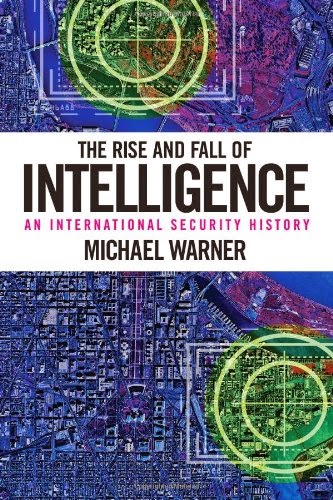
Cindy Wagner
Submitted by Cindy Wagner on
Defense Department historian Michael Warner's timely book The Rise and Fall of Intelligence: An International Security History (Georgetown University Press, 2014) offers an academic but accessible overview of a topic naturally veiled in secrecy and cloaked in misconceptions. The author eschews sensationalism, unlike the still-trending reactions to reactions of the so-called #TortureReport recently released by the Senate Select Committee on Intelligence (Executive Summary: PDF).
 |
| The Rise and Fall of Intelligence: An International Security History by Michael Warner. Washington, DC: Georgetown University Press. 2014. 406 pages. $44.96 hardcover. |
In fact, the details and findings of the SSCI report ought not to be a surprise, as the CIA inspector general's own review of the "enhanced interrogation program," which occurred at about the same time that the Abu Ghraib prisoner abuse scandal broke, was stomach-turning (and policy-questioning) in its own right: "Not a few American officials believed the legal rationale for those techniques could not be defended," Warner writes.
Historically, what Warner refers to as the rise of intelligence is the long-term professionalizing of the endeavors of states to gain strategically useful information from enemies (or to use false information to mislead them). These activities were conducted by entities (predominantly nation-states) to advance or protect their own interests, and were key to preventing wars or winning them efficiently. The rise of intelligence accelerated with technological advancements of the Industrial Revolution; the need for intelligence, with the repressiveness of regimes with conflicting ideologies.
It is enlightening to view the three great crises of the twentieth century--the two World Wars and the subsequent Cold War--through the intelligence lens. Rather than describing the great military battles, Warner focuses on the invisible machinations, the science, that made them successful or not.
World War I had linked science to intelligence. World War II ensured that science would forever be an element of all aspects of the intelligence field. The most important technicians--after the physicists who designed the atomic bomb--were the Allied mathematicians and engineers who delved into the secrets of Axis codes and ensured that the best codes of the Western Allies were impregnable. But other scientists and technicians played important roles on both sides, devising unprecedented new weapons, seeking methods to counter those of the enemy, and gleaning military intelligence reports for clues to what new deviltries the other side was brewing. (p. 103)
A key advantage for the Western Allies was the cooperation between the United Kingdom and the United States, as well as the highly developed skills of analysts "and also decision makers who would listen to them," Warner notes. By contrast, the Soviet Union had more spies in more places, but less willingness than Allied leaders "to consider unpleasant hypotheses." This trait would prove fatal as the Cold War came to an end, when the Soviet economic crisis had been so secret that the CIA actually knew more about it than Gorbachev did when he was a member of the Politburo.
The end of the Cold War was not the end of the need for intelligence, though there would be calls to slash national intelligence budgets, leaving the world vulnerable to new threats. Tools and techniques for intelligence gathering had improved--and spread to more users, including the growing revolutionary movements in Latin America and the Middle East. Drawing inspiration from European anarchist movements earlier in the century, some Arabs "added torture to their toolkits" in addition to surveillance and insurgent penetration.
The rise of jihadists in the aftermath of the Cold War saw more individuals infiltrating the United States and blending in. In 1993, targets included the CIA employees who were on their way to work in Virginia and the first bombing of the World Trade Center in New York.
Al-Qaeda had taken the Leninist strategy of provoking the West to overreaction, the goal being to unite the Muslim world, according to Warner. If one such overreaction was the "enhanced interrogation techniques" adopted with the post 9/11 Guantanamo detainees, it was because "Al-Qaeda constituted a threat that gave no warning of its attacks, sought to inflict mass casualties, and could not be deterred by the threat of death or any strategic concessions that civilized nations could offer."
Thanks to another technological revolution--the computer and the Internet--nonstate actors were gaining as much power as states. The Information Revolution has generated vastly more intelligence and more entities anxious to use or abuse it, while overwhelming analysts. "The digital revolution compounded the [analysis] problem many times over," Warner writes.
As a result, we are seeing the fall of intelligence and perhaps the end of secrets. At the same time, more people have the ability and motivation to "watch the watchers," as exemplified by not just the uprisings resulting in the 2011 Arab Spring, but also Julian Assange's WikiLeaks and NSA contractor Edward Snowden's choice in 2013 to disseminate classified files that forced U.S. officials to defend their collection of information on individuals. Warner's own views on such behavior are expressed diplomatically:
I should explain that I finished this book just as the recent spate of leaks about US intelligence and allied efforts broke in the media. . . . First, I wondered why so many seemed shocked, given the many leaks over the last decade. My second sensation was a curious regret; I would rather have been mistaken about the trend toward the unilateral declassification of sensitive intelligence matters in democratic nations. (p. ix)
Part of the rise of intelligence had to do with an understanding of its value to do good: to prevent wars, to avert deaths and destruction. But the loss of the superpowers' monopoly on intelligence has not made the world less dangerous. Warner concludes:
Intelligence still assists both the spread and the resistance to oppression, but now that assistance occurs in homes and board rooms as well as in government agencies. That might be seen as progress, but it implies consequences that we can barely begin to appreciate. (p. 334)
Future historians may judge the "goodness" or "badness" of intelligence by its relationship with truth.
Cynthia G. Wagner (@CynWag1) is the consulting editor of Foresight SIGNALS.
